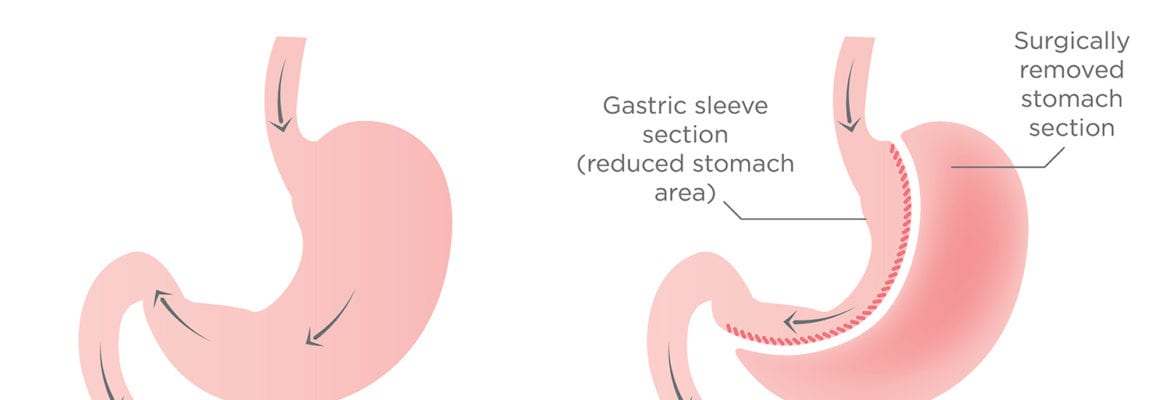
Gastric Sleeve Procedure – How It Works & Who Should Have It
Struggling with weight loss despite countless efforts? The gastric sleeve procedure might be your solution. This popular bariatric surgery not only helps reduce stomach size but also significantly curbs appetite and boosts weight loss. Discover how it works, its benefits, and if it’s right for you. Read on to transform your life.
Table of Contents:
Last Updated on May 27, 2024
If you’re reading this post, you know one thing to be true. Losing weight is not nearly as simple as the common “eat less, exercise more” adage makes it seem. You’ve probably tried to do just that several times, and in many different ways, without long-term success. A gastric sleeve procedure may the answer to permanent weight loss you’ve been looking for.
However, before learning more, it is important to understand that while gastric sleeves are the most popular procedure among bariatric surgery patients, it is none-the-less a surgical procedure. One that can have life-changing implications for more than just your body weight.
Regardless of whether or not you meet other qualifying criteria for the surgery, the success of your surgery depends on your willingness and ability to make permanent changes to your diet, activity levels and overall lifestyle.
How a Gastric Sleeve Procedure Helps You Lose Weight
Gastric sleeve surgery is a bariatric procedure that involves removing a portion of your stomach. The remaining part of your stomach is about the size of a banana. The procedure helps you lose weight in three main ways.
You Eat a Smaller Amount of Food
Mechanism: Gastric sleeve surgery reduces the size of your stomach by about 70%. Following the surgery, you will feel full after eating only a small amount of food and you’ll keep the feeling of fullness for longer than you did before the surgery. Smaller portion sizes mean you’ll consume fewer calories.
It Reduces Your Appetite
Mechanism: In addition to reducing its size, the portion of the stomach removed in a gastric sleeve includes most of the section responsible for producing ghrelin, the hormone that stimulates your appetite by sending hunger signals to the brain. Lower ghrelin production means fewer hunger signals and a reduction in your desire to eat, which also reduces your overall calorie intake.
What Happens During Gastric Sleeve Surgery
A gastric sleeve procedure generally takes less than an hour, and recovery times are fast compared to other surgical procedures:
- Anesthesia: You are given a general anesthetic which puts you to sleep during the procedure.
- Incisions: A few small incisions are made in your abdomen.
- Surgical Instruments: A camera and surgical instruments are inserted through the incisions.
- Stomach Reduction: The surgeon removes the “stretchy” portion of your stomach.
- Sealing: The remaining part of your stomach is sealed with surgical staples, forming the “sleeve”.
- Closure: The instruments are removed and the incisions are closed with stitches.
Is Gastric Sleeve Surgery Right for You?
In general, you can consider gastric sleeve surgery if you meet one of the following physical criteria:
- BMI Criteria: Your body mass index (BMI) is 35 or more.
- BMI with Comorbidities: Your BMI is over 30 and you suffer from sleep apnea, type 2 diabetes high blood pressure, high cholesterol, and/or other obesity-related medical conditions.
- Unsuccessful Weight Loss Attempts: Your repeated efforts to lose weight through changes in diet and exercise have been unsuccessful.
Other factors that may affect your eligibility for a gastric sleeve include your age, if you suffer chronic heartburn and/or if you’ve had previous bariatric surgery.
For more information, please feel free to contact the team at The Sleeve Clinic. We’re happy to provide you with any details and assistance we can.
FAQs
- How long is the recovery period after gastric sleeve surgery?
- “Recovery typically takes 2-4 weeks, with most patients returning to normal activities within a month.”
- What is the expected weight loss after gastric sleeve surgery?
- “Patients typically lose 60-70% of their excess weight within the first year post-surgery.”
- Can gastric sleeve surgery be reversed?
- “No, gastric sleeve surgery is irreversible as it involves permanent removal of a portion of the stomach.”
- Are there dietary restrictions post-surgery?
- “Yes, patients must follow a strict diet progressing from liquids to solids and focus on protein intake and hydration.”
- What are the potential risks of gastric sleeve surgery?
- “Potential risks include infection, bleeding, leaks from the staple line, and nutrient deficiencies.”
Related Posts
- Can You Stretch Your Gastric Sleeve?
- Understanding Role and the Impact of Gastric Sleeve Surgery On Hunger Hormone Ghrelin:
- Does Gastric Sleeve Affect Pregnancy – Impact & Considerations
- Gastric Sleeve Before And After Skin – The Real Picture
- Can You Gain Weight After Gastric Sleeve Surgery?
- Gastric Sleeve Surgery vs. Gastric Bypass: Which is Right for You?





